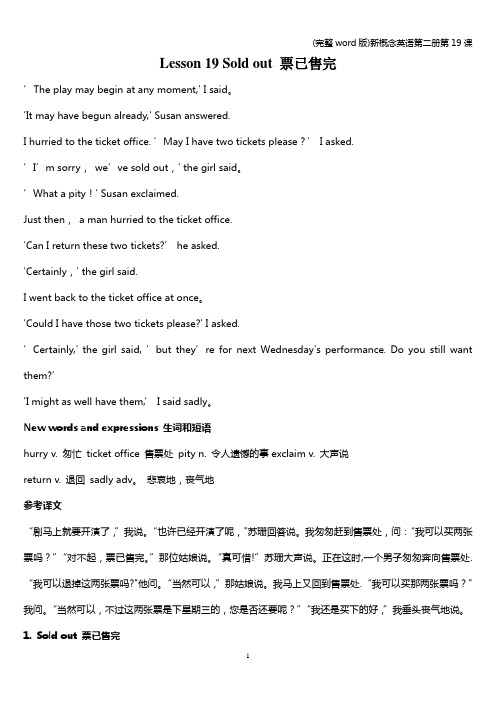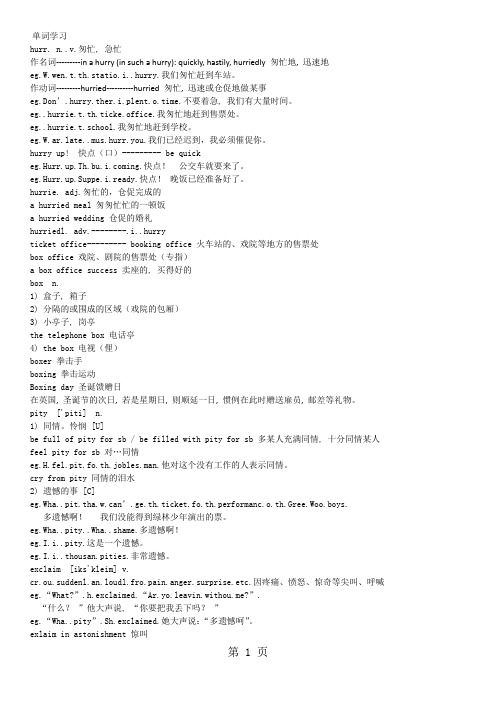新概念2第19课
新概念二-第19课课件

'I might as well have them,' I said _______ .
text
熟读课文:
The play may begin at any moment,’I said. It may have begun already,’Susan answered. I hurried to the ticket office. 'May I have two tickets please?'I asked. 'I’m sorry, we've sold out,' the girl said. What a pity!’ Susan exclaimed. Just then, a man hurried to the ticket office 'Can I return these two tickets?’ he asked'Certainly,'the girl said. I went back to the ticket office at once. 'Could I have those two tickets please?’I asked Certainly,’thegirl said,'butthey're for next Wednesday’s performance. Do you still want them?'I might as well have them,’I said sadly.
课文注释
5. Could I have those two tickets please?我可以买那两张票吗? (1)could 虽然是can的过去式,但在这里并不表示过去,而是指现在。 用could提出请求或建议比can要委婉。(cf.本课语法) (2)在这句话中,have=buy,是行为动词。(cf.第18课语法) 6. I might as well have them. 我还是买下的好。 may as well表示“还不如”、“无甚差别”,和might as well一般可以互换: It's not very far, so we may/might as well go on foot. 那地方不太远,所以我们还不如走着去。 Shall we walk or take a bus?我们走着去还是乘公共汽车? We may /might as well walk. 我们还是走着去吧。(即走着去也一样)
新概念英语第二册第19课-Sold out

新概念英语第二册第19课:Sold outI hurried to the ticket office. May I have two tickets please I asked.我匆匆赶到售票处,问:“我可以买两张票吗?〞I m sorry, we ve sold out, the girl said.“对不起,票已售完。
〞那位姑娘说。
What a pity! Susan exclaimed.“真可惜!〞苏珊大声说。
Just then, a man hurried to the ticket office.正在这时,一个男子匆匆奔向售票处。
Can I return these two tickets he asked.“我可以退掉这两张票吗?〞他问。
Certainly, the girl said.“当然可以,〞那姑娘说。
I went back to the ticket office at once.我马上又回到售票处。
Could I have those two tickets please I asked.“我可以买那两张票吗?〞我问。
Certainly, the girl said, but they re for next Wednesday s performance. Do you still want them“当然可以,不过这两张票是下星期三的,您是否还要呢?〞I might as well have them, I said sadly.“我还是买下的好,〞我垂头丧气地说。
New words and Expressions生词和短语hurryv. 匆忙ticket office售票处pityn. 令人遗憾的事exclaimv. 大声说returnv. 退回sadlyadv. 悲哀地,丧气地Notes on the text课文注释1 The play may begin at any moment,剧马上就要开演了。
【ppt课件】新概念第二册第19课课件-精品文档

• How many kinds of tickets can I buy?
• If I want to buy a ticket,what can I say? • Can(May) I have a ticket,please? • If I want to return the ticket,what can I say? • Can I return the ticket? • If there aren't any tickets,what can I say? • What a pity!
“ The play may begin at any moment,” I said. “It may have begun already,” Susan answered.
at any moment: immediately, at once
随时都可能下雨。
It may rain (at) a arrive at any moment. may have begun: Her friend may have gone abroad. They may be waiting for you at the airport.
Lesson 19 Sold out
Yes, I did.
• Who was with you ?
Susan was.
• She thought the play might have begun already, didn't she ? • What did you do?
I hurried to the ticket office. Yes, she did.
d. wasn’t too pleased to get tickets for next Wednesday’s performance.
新概念英语第二册第19课知识讲解

新概念英语第二册第19课精品文档Lesson 19 sold out 票已售完After I had had lunch at a village pub, I looked for mybag. I had left it on a chair beside the door and now itwasn't there! As I was looking for it, the landlord camein.'Did you have a good meal?" he asked.'Yes, thank you,' I answered, 'but I can't pay the bill. Ihaven't got my bag.'The landlord smiled and immediately went out. In afew minutes he returned with my bag and gave it back tome.'I'm very sorry,' he said. 'My dog had taken in into thegarden. He often does this!'New words and expressions 生词和短语pub [pʌb] n. 小酒店landlord [ˈlændlɔrd] n. 店主bill [bɪl] n. 帐单参考译文:我在一家乡村小酒店吃过午饭后,就找我的提包。
我曾把它放在门边的椅子上,可这会儿不见了!当我正在寻找时,酒店老板走了进来。
“您吃得好吗?”他问。
“很好,谢谢。
”我回答,“但我付不了帐,我的提包没有了。
”酒店老板笑了笑,马上走了出去。
一会儿工夫他拿着我的提包回来了,把它还给了我。
“实在抱歉,”他说,“我的狗把它弄到花园里去了,他常干这种事!”Text1.After I had had lunch at a village pub, I looked for my bag.2. I had left it on a chair beside the door and now it wasn't there!3.As I was looking for it, the landlord came in.4.'Did you have a good meal?" he asked.5.'Yes, thank you,' I answered, 'but I can't pay the bill. I haven't got my bag.'6.The landlord smiled and immediately went out.7. In a few minutes he returned with my bag and gave it back to me.8.'I'm very sorry,' he said. 'My dog had taken in into the garden. He often does this!'参考译文1.我在一家乡村小酒店吃过午饭后,就找我的提包。
(完整word版)新概念英语第二册第19课

Lesson 19 Sold out 票已售完’The play may begin at any moment,' I said。
'It may have begun already,' Susan answered.I hurried to the ticket office. ’May I have two tickets please?’ I asked.’I’m sorry,we’ve sold out,' the girl said。
’What a pity!' Susan exclaimed.Just then,a man hurried to the ticket office.'Can I return these two tickets?’ he asked.'Certainly,' the girl said.I went back to the ticket office at once。
'Could I have those two tickets please?' I asked.’Certainly,' the girl said, ’but they’re for next Wednesday's performance. Do you still want them?’'I might as well have them,’ I said sadly。
New words and expressions 生词和短语hurry v. 匆忙ticket office 售票处pity n. 令人遗憾的事exclaim v. 大声说return v. 退回sadly adv。
悲哀地,丧气地参考译文“剧马上就要开演了,”我说。
“也许已经开演了呢,"苏珊回答说。
我匆匆赶到售票处,问:“我可以买两张票吗?”“对不起,票已售完。
新概念第二册lesson19PPT课件

介绍定语从句的定义,说明限制性定语从句和非限制性定语从句的区别。
定语从句概念及种类
定语从句的构成和用法
非谓语动词概念及种类
非谓语动词的构成和用法
详细解释定语从句的构成方式,包括关系代词和关系副词的选用,给出相应的例句。
阐述非谓语动词的定义,列举常见的非谓语动词形式,如不定式、动名词和分词。
详细解释非谓语动词的构成方式,包括动词形式的变化和句子成分的搭配,给出相应的例句。
重点词汇2
championship(锦标赛)
例句
He won the world championship in tennis last year, making him one of the best players in the world.
重点词汇3
enthusiasm(热情)
例句
The crowd showed their enthusiasm for the home team by cheering and waving flags throughout the game.
针对不足之处进行反复练习,直至熟练掌握。
分享经验
邀请几位口语表达能力较强的同学分享自己的经验和技巧。
讨论问题
小组讨论中,同学们可以提出自己在口语表达中遇到的问题和困难。
互相鼓励
鼓励同学们大胆开口,不怕犯错,相互激励共同进步。
制定计划
根据个人情况制定口语提升计划,包括练习时间、方法、目标等。
06
语态概念及种类
语态的构成和用法
介绍时态的定义,列举常见的时态类型,如一般现在时、一般过去时、一般将来时等。
阐述语态的定义,说明主动语态和被动语态的区别,列举常见的被动语态形式。
新概念第二册第19课

• I might as well take the umbrella with me.
• There’s nothing to do now, so I may as well go to bed.
•.
can & may
1、can和may都可以表示请求, can可以用could,may可以用might代替, 语气更委婉,更有礼貌,但时间上没有区别
'Certainly,' the girl said.
• certainly = of course 例句:Certainly you can do it.
= Of course you can do it.
'I might as well have them,' I said sadly. • may/might as well
It may have begun already.
• already可放句中或句末,意思为 “已经”。
• I have already made great progress in English. 我在英语方面取得了巨大的进步。
• It's eight already. • When I called Jim, he had already left.
推测
• He may have telephoned last night, but I’m not sure.
• He might have telephoned last night, but I’m not sure
must,can‘t\ couldn’t, may\ might+动词原形, 表示对现在、未来的推测 • She must be a model. (must 一定, 很可能) • She may\ might be a model. (may有可能) • She can‘t \couldn’t be a model. (can’t 不可能)
新概念2第19课

行强调,从而突出其重要性。在本文中,强调句型被用于强调实验结果
的重要性和意义。
03
倒装句型的构成及用法
倒装句型通过将谓语或谓语的一部分置于主语之前,从而改变句子的语
序,达到强调或平衡句子的目的。在本文中,倒装句型被用于描述实验
步骤的顺序和逻辑关系。
04
课文内容详解
Chapter
段落大意概括
第一段
"The play was very amusing and I laughed a lot."
这句话说明了作者对戏剧的初步印象,认为它很有趣,并且让自己感到开心。
"I began to understand the…
这句话表明了作者逐渐理解戏剧疑与讨论
• 难点一:如何理解作者对戏剧的陌生感到逐渐产生兴趣的过程? • 解释:作者一开始对戏剧感到陌生,但随着观看的深入,逐渐理解了戏
仔细阅读文章中的细节信息,注意作者使用的语言、语气和逻辑关系, 以便更好地理解作者的意图和态度,从而准确回答问题。
利用上下文推测词义
遇到生词时,不要急于查字典,而是尝试通过上下文推测其词义,这 有助于保持阅读的连贯性和速度。
写作技巧指导
审题立意,明确写作目的
在写作前,认真审题,明确写 作的主题、目的和读者对象, 以便更好地确定写作内容和语 言风格。
03
阅读理解
提供与课文内容相关 的阅读材料,并设置 问题以检验阅读理解 能力。
04
写作练习
要求根据本课所学内 容,撰写一篇短文或 日记,提高写作能力。
答案解析与思路点拨
词汇练习答案解析
针对每个词汇练习题,给出正确 答案,并解释词义和用法。
01
02
新概念第二册第19课课件

这是一个复合句,主句是“I now found myself wondering what I had got myself into”,其中“Although I had been looking forward to this trip for weeks”是让步 状语从句,表示尽管主人公一直期待这次旅行,但他现在却发现自己陷入了困境。
所学知识;小结部分总结本课重点难点,鼓励学生自我评价和反思。
学习方法和建议
学习方法
本课采用讲解、示范、练习和反馈相结合的教学方法,注重学生的主体性和实践 性,通过大量的口语和写作练习提高学生的语言运用能力。
学习建议
学生在学习本课时应积极参与课堂活动,认真听讲、思考和练习;同时要注重课 后的复习和巩固,通过多读、多写、多听、多说等方式提高英语水平。此外,学 生还可以借助网络资源和英语学习社群等渠道拓展学习内容和交流机会。
THANKS
感谢观看
动词不定式的用法:作为主语 、宾语、定语、状语等,表示 具体的或一次性的动作。
语法规则详解
现在完成时的构成
have/has + 过去分词,其中have用于第一人称和第三人称复数,has用于第三人称单 数。
情态动词should/ought to的用法
should表示现在或将来的责任或义务,ought to表示过去或将来的责任或义务,两者 均后接动词原形。
针对发音不准确的问题,可以通过模仿和跟读的方式提高发音准确性。
听后反思及策略调整
针对速记技巧不够熟练的问题,可以 在平时的训练中多加练习,形成自己 的速记符号和缩写方式。
针对对题目理解不够深入的问题,可 以在做题前仔细阅读题目和选项,预 测听力材料的内容,并在听后仔细核 对答案和听力原文。
新概念英语第二册笔记-第19课

单词学习hurr. n..v.匆忙, 急忙作名词---------in a hurry (in such a hurry): quickly, hastily, hurriedly 匆忙地, 迅速地eg.W.wen.t.th.statio.i..hurry.我们匆忙赶到车站。
作动词---------hurried----------hurried 匆忙, 迅速或仓促地做某事eg.Don’.hurry.ther.i.plent.o.time.不要着急, 我们有大量时间。
eg..hurrie.t.th.ticke.office.我匆忙地赶到售票处。
eg..hurrie.t.school.我匆忙地赶到学校。
te..mus.hurr.you.我们已经迟到,我必须催促你。
hurry up! 快点(口)--------- be quicking.快点!公交车就要来了。
eg.Hurr.up.Suppe.i.ready.快点!晚饭已经准备好了。
hurrie. adj.匆忙的,仓促完成的a hurried meal 匆匆忙忙的一顿饭a hurried wedding 仓促的婚礼hurriedl. adv.--------.i..hurryticket office--------- booking office 火车站的、戏院等地方的售票处box office 戏院、剧院的售票处(专指)a box office success 卖座的, 买得好的box n.1) 盒子, 箱子2) 分隔的或围成的区域(戏院的包厢)3) 小亭子, 岗亭the telephone box 电话亭4) the box 电视(俚)boxer 拳击手boxing 拳击运动Boxing day 圣诞馈赠日在英国, 圣诞节的次日, 若是星期日, 则顺延一日, 惯例在此时赠送雇员, 邮差等礼物。
pity ['piti] n.1) 同情。
怜悯 [U]be full of pity for sb / be filled with pity for sb 多某人充满同情, 十分同情某人feel pity for sb 对…同情eg.H.fel.pit.fo.th.jobles.man.他对这个没有工作的人表示同情。
2024版新概念第二册第19课完整ppt课件

语法练习及答案解析
01 练习一
用所给动词的正确形式填 空。
03 练习二
将下列句子改为定语从句。
02 练习三
用非谓语动词完成句子。
04 答案解析
详细解释每个练习的答案,
包括解题思路、语法点解
析等。
06
听力训练与提高
听力材料选择及技巧指导
选择与课文内容相关的听力材料,如课文背景介绍、相 关话题讨论等,帮助学生熟悉话题和语境。
模仿句型三
“They considered him a genius.”(他们认为他 是个天才。)
05
语法知识讲解与运用
时态和语态回顾
一般现在时
表示经常性或习惯性的动 作或状态,以及客观真理 或事实。
一般过去时
表示过去某个时间发生的 动作或状态。
现在进行时
表示此时此刻正在进行的 动作或状态。
时态和语态回顾
新概念第二册第19 课完整ppt课件
目录
• 课程介绍与背景 • 课文解读与赏析 • 词汇拓展与运用 • 句型结构分析与模仿 • 语法知识讲解与运用 • 听力训练与提高 • 口语表达能力提升途径探讨01Fra bibliotek课程介绍与背景
本节课程目标与内容
掌握与了解课文背景知识 训练听、说、读、写四项基本技能
学习与运用课文中的重点词汇和短语
配合多媒体资源,如音频、视 频等,提供更真实的语言环境 和模仿对象。
小组讨论和辩论活动组织
选取热门话题或学生感兴趣的主 题,组织小组讨论,鼓励学生自 由发表观点,锻炼口语表达能力。
开展辩论活动,让学生分组进行 辩论练习,提高思维敏捷性和口
语表达能力。
教师在活动中给予指导和点评, 帮助学生发现问题,改进表达技
新概念英语第二册课件Lesson19共58页PPT

• “也许已经开演了呢,”苏珊回答 说。
• 'It may have begun already,' Susan answered.
肯定 可能 可能 也许 也许
推测 must can could may might
真实性 95% 60% 40% 30% 20%
否定 can’t
can’t
can , could 表示能够
• 1. 表示会做 2. 或很可能做某事。
• 我会弹钢琴。 • I can play piano. • 我明天能来。 • I can • I couldn’t sleep last night.
Could (not) have done
A. wouldn’t B. can’t C. mustn’t D. needn’t
• Some people who don’t like to talk much are not necessarily shy;they ____ just be quiet people.
• A. must B. may C. should
• D. would
—Hi, Tom. Any idea where Jane is? —She_____ in the classroom. I saw her there just now. A. shall be B. should have been C. must be D. might have been
• “真可惜!”苏珊大声说。 • “What a pity!” Sue exclaimed.
Pity n.
• What a pity! • What a shame!
长大成人是多么遗憾的事啊。
新概念英语第二册课件Lesson19(共23页)

• ☆might(may) as well+动词原形:“还是…… 好”(无可奈何)
• had better+动词原形:“最好” (积极心态)
• eg:天看上去要下雨了:I had better take an umbrella.
• 已经下了,非带不可:I might as well take the umbrella with me.
• ☆hurry v.匆忙 • n.in a hurry • if you are not in a hurry(时间上) • if you are not busy(行为上) • in no hurry:不匆忙 • v.Hurry up.快点 • hurry可以取代go,come等 • go to:去;hurry to:匆匆忙忙地去 • come in--hurry in;go out--hurry out
• has begun 已经完成,说明已经做了;won’t begin for a long time 好久都不会开始;
• began a long time ago 过去做了
• must:一定,很可能;may:有可能;can't: 不可能
• 推测“可能”:might比may语气弱 • must>may>might>can't • 2.可以:might比may委婉 • May (Might) I...? 我可以……吗?(只
能和第一人称连用)
• Can(May) I...? • Can you...? • Could I...?(更委婉的说法)
• standing in front of shop windows exclaiming over the beautiful clothes
(完整word版)新概念英语第二册第19课

Lesson 19 Sold out 票已售完'The play may begin at any moment,' I said.'It may have begun already,' Susan answered.I hurried to the ticket office. 'May I have two tickets please?' I asked.'I'm sorry, we've sold out,' the girl said.'What a pity!' Susan exclaimed.Just then, a man hurried to the ticket office.'Can I return these two tickets?' he asked.'Certainly,' the girl said.I went back to the ticket office at once.'Could I have those two tickets please?' I asked.'Certainly,' the girl said, 'but they're for next Wednesday's performance. Do you still want them?''I might as well have them,' I said sadly.New words and expressions 生词和短语hurry v. 匆忙ticket office 售票处pity n. 令人遗憾的事exclaim v. 大声说return v. 退回sadly adv. 悲哀地,丧气地参考译文“剧马上就要开演了,”我说。
新概念2第19课

Melody
Lead in
• 1. Is it always easy to get seats for the theater in your country? For what kind of performances is it easier to book your tickets berore it is showed? • 2. How do you like to spend your weekend evenings? • 3. If you are going on holiday, what kind of activities do you have to book before you go there?
Lisening
1. When was the play going to begin? 2. Were there any tickets left? 3. Why was the writer not very happy about those tickets?
Text
'The play may begin at any moment,' I said. 'It may have begun already,' Susan answered. I hurried to the ticket office. 'May I have two tickets please?' I asked. 'I'm sorry, we've sold out,' the girl said. 'What a pity!' Susan exclaimed. Just then, a man hurried to the ticket office. 'Can I return these two tickets?' he asked. 'Certainly,' the girl said. I went back to the ticket office at once. 'Could I have those two tickets please?' I asked. 'Certainly,' the girl said, 'but they're for next Wednesday's performance. Do you still want them? 'I might as well have them,' I said sadly.
新概念第二册第19课课件(版)

新概念第二册第19课课件一、教学目标1.知识与技能:学生能够理解并运用本课所学的词汇和句型,描述家庭成员及其职业。
2.过程与方法:通过听、说、读、写等多种方式,提高学生的英语交际能力。
3.情感态度与价值观:培养学生热爱家庭、尊敬长辈的情感,增强对英语学习的兴趣。
二、教学内容1.词汇:father,mother,brother,sister,doctor,teacher,driver,worker2.句型:Whatdoesyourfatherdo?Heisadoctor.Whataboutyourmother?Sheisa teacher.三、教学重点与难点1.教学重点:掌握词汇和句型,能够描述家庭成员及其职业。
2.教学难点:正确使用句型进行交际,注意家庭成员称谓的用法。
四、教学过程1.热身活动(5分钟)老师与学生用英语进行自我介绍,互相询问家庭成员。
学生两人一组,用英语描述自己的家庭成员。
2.词汇学习(10分钟)老师展示图片,引导学生学习新词汇。
学生跟读并模仿发音,注意家庭成员称谓的用法。
3.句型学习(10分钟)老师示范句型的用法,引导学生进行模仿。
学生两人一组,用句型进行问答练习。
4.听力练习(10分钟)老师播放录音,学生听并回答问题。
学生两人一组,进行听力练习。
5.口语练习(10分钟)老师组织学生进行角色扮演,模拟家庭成员的交际场景。
学生两人一组,进行口语练习。
6.作业布置(5分钟)学生回家后,用英语向家人介绍家庭成员及其职业。
完成课后练习题。
五、教学评价1.课堂表现:观察学生在课堂上的参与程度、积极性和合作精神。
2.作业完成情况:检查学生作业的准确性和完整性。
3.口语表达能力:评估学生在口语练习中的表达能力和交际能力。
六、教学反思1.教师应注重培养学生的听、说、读、写综合能力,提高学生的英语交际能力。
2.教师应关注学生的学习需求,因材施教,激发学生的学习兴趣。
3.教师应加强对学生的个别辅导,帮助学生克服学习难点。
新概念二第十九课课文

新概念英语第二册第19课课文Sold outLesson 19: Sold outIt was a busy day at the theatre. The play was sold out, and there were no tickets available at the box office. People were standing in long queues, hoping to get a ticket from someone who couldn't make it.Among the crowd was a young man named Tom. He had been looking forward to seeing this play for weeks, but he had waited too long to buy a ticket. Now, he was desperate to find one.As he stood there, he noticed an elderly woman walking slowly towards the front of the queue. She looked tired and sad, and Tom could tell that she wasn't going to be able to see the play either.Feeling sorry for her, he approached her and asked if she needed any help. The woman explained that she had been trying to get a ticket for her granddaughter, who was a huge fan of the play. Unfortunately, she had arrived too late, and there were no tickets left.Tom felt even more determined to help her. He askedaround the crowd if anyone had an extra ticket, but no one did. Then, he remembered that his friend had bought two tickets but couldn't come with him. He quickly called his friend and asked if he could give the spare ticket to the elderly woman.His friend agreed, and Tom handed the ticket to the woman. She was overjoyed and thanked him profusely. Tom felt good about himself for helping someone in need.In the end, Tom didn't get to see the play, but he knew that he had done the right thing. Sometimes, helping others is more important than achieving our own goals.。
新概念2第19课

04
语法知识与运用
本课重点语法项目介绍
现在完成进行时
本课重点介绍了现在完成进行时的构成、用法及与现在完成时的区别。现在完成 进行时强调动作从过去持续到现在,并可能继续持续下去,常与表示一段时间的 状语连用。
情态动词+have done
本课讲解了情态动词+have done的结构,表示对过去事情的推测或判断。不同 的情态动词有不同的含义和用法,需要根据具体语境进行理解和运用。
语法知识在实际应用中的注意事项
在使用现在完成进行时时,需要注意动作持续的时间段和与 现在完成时的区别。同时,在表达过去持续到现在的动作时 ,要确保使用正确的时态和语态。
在使用情态动词+have done结构时,需要根据具体语境选 择合适的情态动词,并理解其含义和用法。同时,要注意与 其他时态和语态的区分,避免混淆。
词汇3
详细解释词汇1的含义、用法及例句 。
详细解释词汇3的含义、用法及例句 。
词汇2
详细解释词汇2的含义、用法及例句 。
常用短语举例
短语1
解释短语1的意思,并给出例句。
短语2
解释短语2的意思,并给出例句。
短语3
解释短语3的意思,并给出例句。
词汇在语境中的应用
01
02
03
句子1
包含重点词汇和短语的句 子,突出其在实际语境中 的应用。
相关例句分析与练习
现在完成进行时例句
I have been studying English for two hours.(我已经学习英语两个小时了。)
情态动词+have done例句
He must have finished his homework, because he is playing football now.(他一定已经完成作业了,因为 他现在正在踢足球。)
新概念英语第二册lesson 19

本课关键句型:can和may 的用法 ① can和may都可以表示请求,can可以用could, may可以用might代替,后者语气更委婉,更有礼 貌,但时间上没有区别。
Can/could I use your phone please? May/might I use your phone please? 回答:of course you can/may. (肯定) no, you can’t/may not. (否定)
本课难点:缩略形式 I
am=I’m We will=we’ll We have= we’ve ……
补充练习答案
lesson 19 1.C 2.D 3.D 4.B 5.C 6.D 7.D 8.A
② vt. 把…送回,归还,退回
He returned the books to the library. Return money=pay back 还钱
The
play may begin at any moment.
At any moment 在任何时候,随时 At the moment=now At that moment= just then 就在那时 May+动词原形,表示对现在、未来的推测
I went back to the ticket office at once.
At once=immediately 立刻,马上
I might as well have them.
Might as well+动词原形,还是…好(无可奈何),不 妨…
I might as well take the umbrella with me. Had better+动词原形,最好…
- 1、下载文档前请自行甄别文档内容的完整性,平台不提供额外的编辑、内容补充、找答案等附加服务。
- 2、"仅部分预览"的文档,不可在线预览部分如存在完整性等问题,可反馈申请退款(可完整预览的文档不适用该条件!)。
- 3、如文档侵犯您的权益,请联系客服反馈,我们会尽快为您处理(人工客服工作时间:9:00-18:30)。
New words and expressions
★ exlaim (v.) 大声说 exlaim over 因… 惊叹: eg. Standing in front of windows exclaiming over theclothes exlaim in astonishment 惊叫 exlaim in delight 高兴地大叫 shout 呼喊,大声说话,吼叫 shout out 吼出声来 eg. Don’t shout at me. I can hear you all right. 别大声对我喊,我能听清你的话 shout for joy / shout with joy 大声欢呼 shout oneself hoarse [hɔ:s] 把嗓子喊哑 scream 发出尖叫,惨叫。惊叫
Lisening
1. When was the play going to begin? 2. Were there any tickets left? 3. Why was the writer not very happy about those tickets?
Text
'The play may begin at any moment,' I said. 'It may have begun already,' Susan answered. I hurried to the ticket office. 'May I have two tickets please?' I asked. 'I'm sorry, we've sold out,' the girl said. 'What a pity!' Susan exclaimed. Just then, a man hurried to the ticket office. 'Can I return these two tickets?' he asked. 'Certainly,' the girl said. I went back to the ticket office at once. 'Could I have those two tickets please?' I asked. 'Certainly,' the girl said, 'but they're for next Wednesday's performance. Do you still want them? 'I might as well have them,' I said sadly.
Text Explanation
2. 'I'm sorry, we've sold out,' the girl said. • sell 1) sell out(of sth.) 售完 eg. We’ve sold out of all the ticksts. / All the tickets have been sold out. eg. We are sold out of Sunday newspaper, Sir. 先生,星期天的报纸已经卖完了。 2) sell well / badly 畅销/滞销 eg. The tickets for the play sold well / badly. 这部戏的票卖座/滞销。
{ { {
New words and expressions
★pity 1.同情,怜悯(U.) be full of pity for sb / be filled with pity for sb 多 某人充满同情,十分同情某人 feel pity for sb 对…同情 eg. He felt pity for the jobless man. 他对这个没有工 作的人表示同情。 cry from pity 同情的泪水 2. 遗憾的事 [C] eg. What a pity! It's a pity. It's a pity to be a gown-up. I'm sorry to hear that! What's the difference between pity and sorry?
Key Structures
1.May I 提问,肯定回答用you can,否定回答用mustn’t eg: —May I use your ruler? —Of course, you can. —May I leave now? —Sorry, you mustn't. 2.Must 提问,否定回答要用needn’t/don’t have to eg: —Must I return it now? —No, you needn't./No, you don't have to. 3.表推测的情态动词的反意疑问句 1)对现在的肯定推测 eg:He must be a doctor, isn’t he? They must be friends, aren't they? 2)对过去的肯定推测 eg:He must have been sleeping when you called him, wasn’t he? He must have gone to Dalian, hasn’t he? It must have rained last night, didn’t it?
New words and expressions
hurry ['hʌrɪ] exclaim [ɪk'skleɪm] ticket office return [rɪ'tə:n] pity ['pɪtɪ] sadly ['sæ dli] n. 匆忙,急忙 v. 大声说 售票处 v. 退回 n. 令人遗憾的事 adv.悲哀地,丧气地
Key Structures
may & can 1. 都可表示请求、许可 eg. Can/May I borrow your ruler? can一般表示客观情况的“允许”,而may一般表示说话人主观的“允 许” 2.都可表示“可能性”。 eg. She may know the answer to the question. Where can Luch be at the moment? ① 在陈述句中,can表示“客观上的可能性”,而may表示“主观上的 可能性” eg. The road can be blocked. 路可能堵住了。(客观) You may be right.(主观) ① 表示现实可能性时,can常用于否定句和疑问句中,持怀疑和不相信 的态度,而may通常不用在疑问句中,持猜猜或判断的态度。 eg. Can it be John? It can't be ture. ① 在否定句中,can't表示“不可能”,may not 表示“也许不”。 eg. Nick can't go to Dalian. Nick may not go to Dalian.
New words and expressions
★sad (adj.) 悲哀的,忧愁的,难过的(---dder, ---ddest ) a sad look 一个悲哀的表情a sad story 一个悲惨的故 事 a sad event 一件悲哀的事情 eg. John is sad because his dog has been dead. 约翰很悲伤,因为他的狗死了。 I am very sad to hear the news. 获悉这个消息,我很悲痛。 sadly (adv.)悲哀地,丧气地 eg. She looked at him sadly, and said sadly, “I am leaving you”. 她难过地看着他,然后忧伤地说:“我要走了”。 sadness (n.) 悲哀,悲伤 [U]
• at any moment=at any time 随时 at this/the moment=now 此时此刻 at that moment=just then 就在那时 in a moment 立即,马上
情态动词may might must can
• might 可能性最小 may 可能 must 指比较肯定的判断 • must / can't / may + 动词原形: 表示对现在的肯定、否定、可能性推测 eg. You must be Tina. I’ve seen your picture. 你一定是蒂娜,我见过你的照片。 eg. You can’t be Tina. She has been abroad. 你不可能是蒂娜,她已经出国了。 eg. She may be Tina, but I’m not sure. 她可能是蒂娜,但我确定不了。 • must / can't / may have done 对过去的肯定、否定、可能性推测 eg. I can’t find my bag. It must have been stolen. 我找不到包,一定是被偷了。 eg. Jane walked past me without speaking. She can’t have seen me. 简从我身旁走过没说话,她一定是没有看见我。 eg. The bag may have been stolen. 书包可能是被偷了。
Text Explanation
3) sell for /at + 价格 以…价格出售 eg. The antique vase will sell for 5000 dollars at least. 这件古花瓶至 少要卖5000美元。 eg. Cabbage is selling at a high price this year. 今年洋白菜的价格很 高。 4) seller 售货人 ←→ buyer 买方 salesman 男外卖员、推销员 saleswoman 女店员,(美)女推销员 an insurance salesman 保险推销员 5) sale(n.) for sale 待售 a house for sale 待售的房子 on sale 出售,上市;廉价,特价 (Am.) eg. They sell eggs on sale that day. 那天鸡蛋特价销售。
